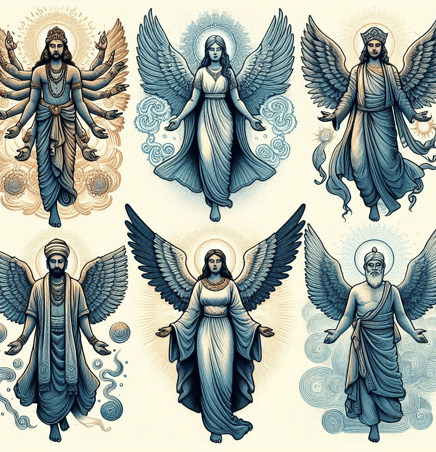How Various Religions View and Interpret Angels
Angels have fascinated humanity for millennia, appearing in the sacred texts and traditions of many religions. These celestial beings are often seen as messengers, protectors, and intermediaries between the divine and humanity. Let’s explore how different religions view and interpret angels.
9/16/20242 min read


Christianity
In Christianity, angels are considered servants and messengers of God. They are often categorized into different hierarchies:
Archangels: Higher-ranking angels like Michael, Gabriel, and Raphael play significant roles in biblical narratives.
Guardian Angels: Assigned to protect and guide individuals throughout their lives.
Seraphim and Cherubim: Angels who are close to God’s throne, involved in worship and praise.
Notable angels include Michael, known as the protector and leader of the heavenly armies, and Gabriel, the messenger angel who delivered important announcements, such as the birth of Jesus.
Islam
In Islam, angels (Mala’ika) are seen as obedient servants of Allah, created from light. They perform various duties:
Messengers: Angels like Jibril (Gabriel) deliver revelations to prophets.
Record Keepers: Angels who record the deeds of individuals for the Day of Judgment.
Protectors: Angels assigned to guard and guide people.
Notable angels include Jibril, who conveyed the Quran to the Prophet Muhammad, and Mikail, responsible for providing nourishment to bodies and souls.
Judaism
In Judaism, angels (mal’akhim) are seen as God’s messengers and agents:
Messengers: Deliver messages from God to humans.
Warriors: Protect the faithful and execute God’s judgments.
Guides: Provide guidance and support to individuals.
Notable angels include Michael, the protector of Israel, and Gabriel, the messenger and enforcer of God’s will.
Hinduism
In Hinduism, celestial beings similar to angels are known as devas and apsaras:
Devas: Divine beings who govern natural forces and cosmic order.
Apsaras: Celestial nymphs known for their beauty and grace, often associated with water and dance.
Devas protect the world from demonic forces, convey divine messages, and assist in spiritual growth and enlightenment.
Buddhism
In Buddhism, celestial beings called devas and bodhisattvas have roles akin to angels:
Devas: Higher beings living in celestial realms, often seen as protectors and benefactors.
Bodhisattvas: Enlightened beings who assist others on their path to enlightenment.
These beings are revered for their wisdom and compassion, guiding individuals towards spiritual awakening.
Sikhism
In Sikhism, angels named Chitar and Gupta record the decisions of all people:
Chitar: Records deeds that other humans see.
Gupta: Records deeds that are hidden from other people but known to God.
These angels play a crucial role in maintaining the moral and ethical balance in the universe.
Conclusion
Angels are a common thread that connects many spiritual traditions, each offering unique perspectives on their roles and significance. Whether seen as messengers, protectors, or guides, angels continue to inspire and comfort believers around the world.


